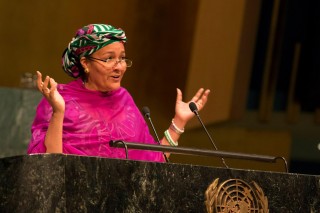The Minister of Environment, Amina Mohammed at a Green Bond Public Private Advisory group meeting recently in Abuja, said the government is determined to increase the nation’s funding options in the financing of its development objectives. The issue of green economy has been a part of President Muhammadu Buhari’s Change Agenda and it also plays a prominent role. The Green Bond advisory meeting initiated by the environment ministry in collaboration with the Minister of Finance indicates that Nigeria is ready to step to the challenge as the country is expected to tap into the growing global market for green bonds, estimated to have reached $100 billion by the end of 2016.
In 2016, President Buhari signed the Paris Agreement at the 71st session of the United Nations General Assembly (UNGA71) to demonstrate Nigeria’s commitment to the global effort to reverse effects of the negative trend of global warming. The president expressed Nigeria’s commitment to reducing Greenhouse Gas Emissions unconditionally by 20 percent and conditionally by 45 percent which is in line with Nigeria’s Nationally Determined Contributions. He also promised to mobilise internal and external resources to meet Nigeria’s targets, adding that the 2017 budget will reflect Nigeria’s efforts to accord priority to realising its NDCs. “In addition, we are set to launch our first ever Green Bonds in the first quarter of 2017 to fund a pipeline of projects all targeted at reducing emissions towards a greener economy,” said President Buhari.
Obi Ugochuku, Managing Partner, GCA Capital Partners stated at the meeting that green bonds have been used to support a portfolio of commercially viable projects, which can provide a revenue stream that could offset the bond. He said sovereign green bonds are the catalyst for other forms of investment, to demonstrate that projects are capable of providing a return to investors. He reckoned that with an expenditure of 10 billion naira to establish pilot projects including Renewable Energy Micro-Utilities in 45 communities, benefits will come in the form of taxes from electricity tariffs, service charges, increased economic activity, job creations, taxes on income streams. A 2.83 billion naira pilot project to tackle drought and desertification with a potential to increase the portfolio of trees, create jobs and other economic benefits are in the pipeline.
A statement from the Ministry of Environment quoted Amina Mohammed as saying that the advisory group will provide advice and also identify likely impediments to the issuance bond process and provide guidance on how projects can be certified “Green”. The Minister further stated that the group is set up to provide support to the Federal Ministry of Environment in its implementation of the Green Bond guidelines in order to maintain a process that is transparent and consistent. Guidelines: the projects should be green in nature, the project cost should form part of the Medium Term Sector Strategies (MTSS) of selected Ministries Departments and Agencies (MDAs). The project should have a defined revenue model or economic impact that generates resources that will be used to service the green bond and the emissions contributions of the projects should be calculated and documented.
Amina Mohammed further said the projects are designed for the benefit of the people: “They are supposed to take advantage of the fact that they are designed in a way to bring better benefit to the people. The air they breathe, the environment they live in is less impacted either by erosion or climate change. The things making those things happen are the emission that we have. Gas flaring, exhaust fumes, all of these contribute to the global warming we have.
“The projects are to try to reduce the global warming, to create jobs. Like the transport sector, instead of many people carrying their vehicles to the road, pumping out emissions and everybody having asthma and coughing, we will have buses that will not use diesel; they are electric or use cleaner fuel, conveying thousands of Nigerians between Suleja and Abuja. That route will have infrastructures that will provide jobs, reduce the stress of movement, less hypertension and clean the air. The use of solar power to supply energy to our tertiary institutions, which means for the first time they will have uninterrupted power supply.”








